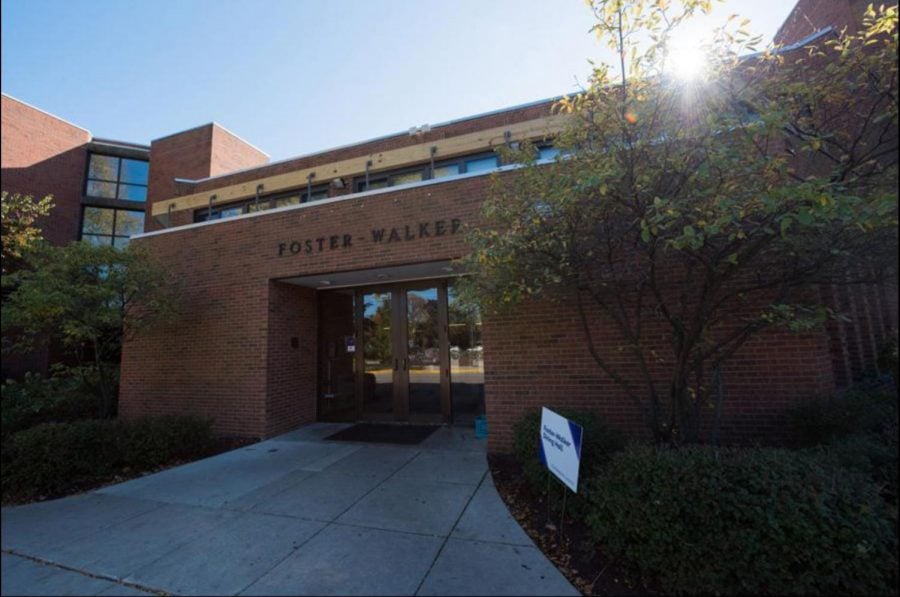Students at community dialogue criticize administration for lack of transparency, failure to address student demands
Daily file photo by Leah Dunlevy
Foster-Walker Complex. Students at a community dialogue Thursday criticized the administration for failure to properly address student concerns.
May 2, 2019
Students and administrators discussed mental health and campus climate at this quarter’s community dialogue in Foster-Walker dining hall on Thursday.
During the discussion portion of the dialogue, students discussed multiple issues they had with the administration, including a lack of transparency from administrators and a lack of communication regarding how they deal with issues of student wellbeing. Several students mentioned mental health as an issue, and a need to increase the staff and resources of services such as Counseling and Psychological Services, Center for Awareness, Student Enrichment Services, and sustainNU.
Medill sophomore Emma Evans discussed campus climate and space equity on campus. Evans said many marginalized groups lacked a space to socialize compared to predominantly white Greek life, which she said was exacerbated by the two-year live-in requirement. Evans also said conversations were circular and repetitive in Northwestern-created task forces.
“We’re tired of having the same conversation over and over and it’s hard to see the point of conversations like this and task forces when there’s documents of recommendations that are out there,” Evans said.
This was the second community dialogue to follow a new format established during Winter Quarter after Associated Student Government and Quest+ recommended changes. Previous community dialogues were done in a more traditional town hall format, where a moderator would select people from the audience to answer questions. However, the current format groups students and administrators into tables centered around topics salient to students such as mental health, financial aid, campus climate and student and faculty interactions. The format change was an attempt at eliminating the confrontational attitude the old format fostered.
“We had a very successful experience at the last community dialogue,” Associate Provost and Chief Diversity Officer Jabbar Bennett said in opening remarks. “And part of that success has to do with the students themselves who said ‘The old way that you’re doing it, this whole approach, really isn’t working that well.”
Bennett said several officials who usually attend the community dialogues were unable to attend. University President Morton Schapiro was originally scheduled to come, but was participating in the Walk to Remember event for Holocaust victims, while Provost Jonathan Holloway was traveling to Northwestern University in Qatar for commencement. Vice President for Student Affairs Patricia Telles-Irvin was also unable to attend.
Before the community dialogue started, eight student activists from Black Lives Matter NU, Fund Our Care Collective and Students Organizing for Labor Rights walked in and stood silently at the back of the room. The activists wore signs taped on their red shirts reading “I heart black students, I heart FGLI students, I heart my mental health. Does Northwestern?” which were modeled after the “I Heart Northwestern” campaign and used as an act of solidarity.
Weinberg junior and SOLR member Seri Lee told The Daily the student groups partnered to protest what they felt was inaction on the administration’s part towards student demands. Lee said community dialogues pretend students have an impact on policy, but they ultimately have little impact on creating solutions to the systemic issues the university ignores. Lee said there was a 51-year long history of administrators ignoring student demands, referring to the Bursar’s Office Takeover in 1968.
Toward the end of the town hall, Bennett acknowledged the activists, asking if there was anything they wanted to let the room know. Communication senior Danielle Douge said she was frustrated with how decentralized and unaware of student demands administrators are, especially since student organizations work so hard to publicize their concerns to the Northwestern community.
“You guys don’t know student concerns that we’ve presented multiple times,” Douge said. “That’s incompetence. You guys should all be in connection and discussion with each other and know these things, especially since we make these things public.”
Email: [email protected]
Related Stories:
– Students, administrators talk mental health, financial aid at first community dialogue using new format
– New community dialogue format aims to improve interaction after concerns
– Students share grievances about SAE return, housing rates at community dialogue


